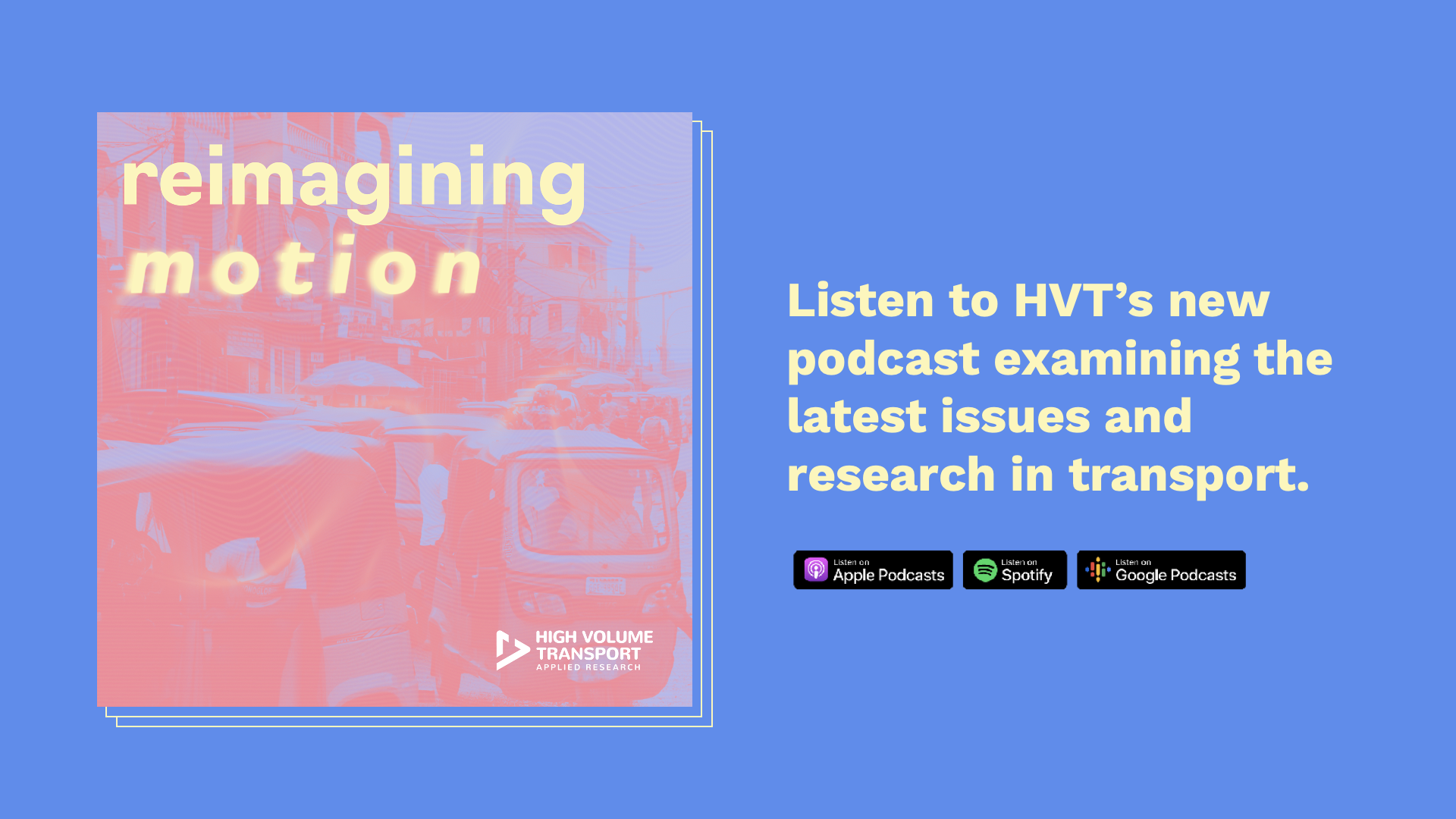If we are left with one overriding reflection from this year, it is that we need to make our infrastructures more resilient.
We have seen unprecedented challenges from the COVID19 pandemic, economic and political instability and the ever-pressing climate crisis. And our transport systems are vital to keep people and goods moving, yet far too often they are badly impacted by the challenges of recent times and grind to a halt.
Throughout 2022, HVT has been responding to the challenge to build resilient transport that is greener and inclusive. Here we take a brief look at highlights from the year and take the opportunity to thank all our partners, researchers and supporters who have made our successes possible.
Climate Crisis
In response to the urgent need to address the climate crisis, HVT’s work this year has focused heavily on climate change mitigation and adaptation, specifically the transition to more efficient transport systems which produce less emissions and reduce carbon footprints. HVT’s Senior Technical Director, Bernard Obika, joined a global panel exploring ‘Building Resilience in Transport Project Design’ at this year’s Transforming Transportation conference in February and outlined the need for a methodology for managing infrastructure resilience, saying:
“The one single lesson we’ve learnt from our extensive research is that there is a need to build systems that are much more resilient.”
Developing this idea further, our first Research Knowledge Exchange webinar of 2022, held in March, was entitled ‘Developing Climate Resilient Transport, Informing policy & planning for greener and safer transport networks’. It showcased two HVT projects, Climate Resilient Transport: A Policy Guide from the University of Birmingham and the Transitions project from Vectos.
HVT then supported and attended the Africa Regional Forum for Action – Inclusive & Active Mobility in a Changing Climate conference hosted by UNEP, UN-Habitat and Global Green Growth Institute in Kigali, Rwanda. The forum saw 120 policy and decision makers gather from Africa and international partners with the aim to agree a roadmap of climate action for the next five years. FCDO’s Transport Research Adviser, Anne Joselin spoke of the impact of HVT’s research in her keynote speech, saying it provides insights:
“To enable more efficient, low carbon, affordable and safer transport networks that meet people’s needs”.
Presentations included
- Bronwen Thornton of WAlK21, speaking about her work on the impact of Covid-19 on climate change mitigation: Walking and Cycling Policy and Practice in Africa.
- Crystal Asige, speaking about Roadnote 21
- Steve Cinderby from the Stockholm Environment Institute at the University of York showcasing Guidelines on Using Creative Participatory approaches for inclusive climate resilient transport planning in Africa,
- Tom Russell presenting the ongoing joint project by the universities of Oxford and Southampton, Decision Support Systems for Resilient Strategic Transport Networks in Low Income Countries.
- Dorica Mugusi, ITDP speaking about the CityRetrofit for All project.
- Tim Durrant, Vectos, speaking about the Transitions project

At COP 27 in Sharm el-Sheikh we focused on a just transition, echoing the overall call for action from the meeting to address the inequality of the climate change burden between the rich and poor countries of the world. At a five-day side event organised in partnership with the Climate Compatible Growth Programme, HVT held three sessions which included:
- Making investment work hard to achieve greener, more resilient transport, moderated by former World Bank Country Director, Henry Kerali with speakers including:
- Martin Humphreys, who is the Lead Transport Economist and Global Lead for Transport Connectivity and Regional Integration at the World Bank, speaking about the update to the Highway Development and Management Model – currently called HDM-4.
- Tom Russell and Jim Hall from the University of Oxford who have been working on an HVT project to develop decision support systems for resilient strategic transport networks in low income countries – providing transport decision-makers in LMICs with support tools, which enable them to prioritise interventions that will deliver sustainable and resilient long-distance transport networks.
- Isaac Tchinga Mzengereza from Go-Metro, who is part of the Africa Urban Mobility Observatory (AUMO) project that is piloting innovative techniques to obtain data about people’s movements and modes of transport to support resilient transport development.
- Opportunities for African cities to meet their transport and urban planning needs in a greener, more sustainable way, moderated by the Institute for Transportation and Development Policy’s (ITDP) Heather Thompson with speakers including:
- Chris Kost, ITDP, currently working on the HVT project City Retrofit, which seeks to understand how transit-oriented development has been pursued in LMICs and what can be learned from those efforts.
- Paul Curtis, Vectos, currently working on an HVT project that sets out to understand how we can better enable a more efficient, low carbon, affordable and safe transport network for the cities of Sub-Saharan Africa (SSA), working proactively with the informal public transport sector who provide over 70% of the transport needs in these cities.
- Gail Jennings, independent researcher specialising in mobility access, equity, public space, energy, public health and urban development. During the session she specifically spoke about active transport and the opportunity it presented.
- Unlocking a pathway to low carbon transport in African cities without compromising economic growth, moderated by Henry Kerali. The session included presentations and panel discussion from:
- Francis Mwangi, Lead in Sustainable transport from Kenyan National government and Esther Gacanja, from the Kenyan State Department of Transport, spoke about the challenges, successes and future plans for transport in Kenya.
- Bronwen Thornton, from Walk21, spoke about walking as the primary mode of transport for most people in African cities and yet highlighted that it is often overlooked when considering planning infrastructure at both a policy and practical level.
- Romanus Otieno Opiyo and Gary Haq, University of York spoke about ways to include all voices from communities in transport planning. They highlighted the recently published guide on Inclusive Climate Resilient Transport Planning in Africa, and showcased the work with the launch of a film.
- Clive Roberts, University of Birmingham, gave an update on the work coming from the Birmingham Centre for Railway Research and Education (BCRRE), with industry partners Porterbrook, on hydrogen fuel technology and its potential to transform rail transport across the globe.
Inclusive transport
At the International Transport Forum in Leipzig in May the focus was on developing more inclusive transport for LICs. At a side event, co-hosted with the International Road Federation and SuM4ALL, a panel consisting of Rutul Joshi of CEPT university in India, Tom Fleming of ITP, IRF Director Susanna Zammataro and Walk 21 CEO Bronwen Thornton discussed the need for a major change to make transport more inclusive and resilient. It was a successful event, with HVT team members able to discuss our priorities with high level policy makers such as the (then) UK Transport Secretary Grant Shapps.
Supporting decisions with research and data
All of our work is underpinned by our core belief that infrastructure needs robust and insightful research to inform such important and long-term investments. Our second RKE of the year tackled the key subject of data and decision support systems. In this webinar we explored how large transport infrastructure developments can be supported by research and data and highlighted innovative approaches to data collection which can be used in LICs. It featured presentations from Oxford University’s Tom Russell on the decision support system which uses open data to map and model the impact of climate change on transport systems and from Philip Krause of Go Metro on the Africa Urban Mobility Observatory (AUMO) which compares low cost mobility data collection methods.
Philip Krause appeared again to discuss the role of data in Transit-Oriented Development (TOD) as a guest on the first series of Reimagining Motion, the HVT podcast series launched in October. In this four-part season, Holger Dalkmann, Founder and CEO at Sustain 2030, spoke to transport experts about TOD which enables residents to live closer to jobs and services so reducing the time and environmental burden of transport and boosting economic growth.

Other guests were Jacob Mason of the Institute for Transportation and Development Policy (ITDP) who spoke about TOD as a mode for developments in African cities; Rutul Joshi of CEPT University, India who explored urban planning in Indian cities and how COVID has influenced wider discussions on TOD; and Tim Durant of Vectos who talked about the informal public transport sector and its effects on urban development, climate change and affordable mobility. The podcast has seen a healthy download rate on all the major outlets and is to be followed by a second series in the new year.
Thank you
As we look towards 2023, we look forward to new programmes and further research bringing support to policy makers and practitioners developing transport systems that are greener, resilient and inclusive. Thanks again to all those who make this possible, we look forward to the challenges and successes to come.

